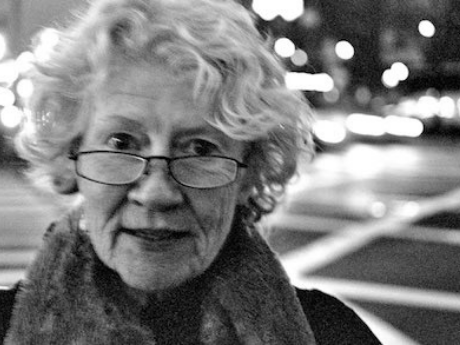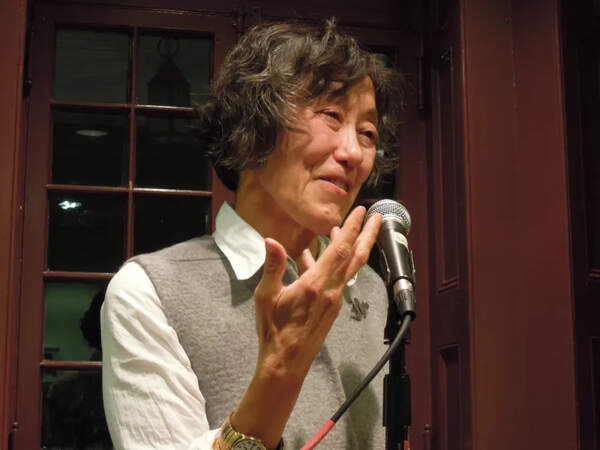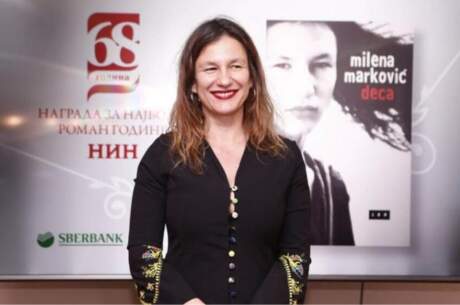Interviews
A Conversation: Jean Valentine & Eve Grubin

Eve Grubin: When writing a poem do you think about someone you are writing to?
Jean Valentine: I just think about the poem. Sometimes in the past it has helped me to think about writing a letter to a close friend or an imaginary friend just to get myself into that kind of talk, into the confiding and intimate nature of that kind of talk. But I have not done that for years. I think about how the poem is communicating later when I am revising it. I might have been writing about a certain relationship, for instance, and not realized that at the time. That wouldn't be to somebody, though. I don't think consciously very much at all when I am first writing. Consciousness comes later.
EG: What gets you to start writing? A phrase, an image, or something else?
JV: I would be lucky to have a phrase or an image. Sometimes phrases come from dreams, and I find that just wonderful, and that could set me off. Or sometimes it's something I heard someone say or something I read. More likely I begin with a feeling. I free-write out of a feeling to get started. For instance: "Today is the anniversary of the World Trade Center..."
EG: Are you writing poems about the World Trade Center?
JV: I have written a couple. I am actually about to take part in a reading on Wednesday night, September 11th, for the anniversary. I have read a few poems on the subject that I like very much, and I will read some of them on Wednesday. But most of what has been written on the subject hasn't struck me as very good. I remember when Kennedy was shot, and no good poems came out of that. There was a book right away. You know, this is America. It may be after our lifetime that more good poems can come out of these events. But it's interesting because during World War One there were those wonderful poets, Wilfred Owen, Siegfried Sassoon and others. And then during World War Two, very few good poems were written except by Celan, afterwards. During Vietnam there were so many poets who were involved. There were all the anti-war readings and people wanted to write about it. I could be missing something, but I didn't see many wonderful poems that came out of that.
EG: But it seems that there is a real interest in political events in your work
JV: That's nice that you feel that way. I just had a piece sent to me this summer about my work being more political than people generally recognize which was very comforting to me because I have been out in the wilderness with that although I was close friends with some political poets. I am still close with Adrienne Rich, Grace Paley, and Jane Cooper, who all did a lot of very directly political work. So I wanted to try, not only because I cared, but also because it seemed like the right thing to do. My friends weren't putting pressure on anybody, certainly. But I felt I could do it. This was in my thirties and forties. Not in my first book, but in the late 60's, early 70's I began to feel certainly very concerned about Vietnam, very anti-war, but I couldn't write about it with any directness. So then I kind of calmed down about it, and I thought, "Well, I can only write what I can write," and people helped me to see that. Everybody can only write what they can write. And so I guess what has happened is that I have been able to write more obliquely about the things I care about but not in the straight ahead way I wanted to, which many people have been able to do.
EG: Your poems are saturated with religious curiosity and yearning. Has that always been central for you?
JV: Always. Ever since I was a child. Jane Kenyon had this, too. Not everyone has. I'm very grateful. It wasn't particularly in my family. Maybe one has a guardian angel. It's really a mystery where that comes from. Here, in America, you would never presume that the person next to you would share your religious feelings. I went to a poetry reading in Ireland where Seamus Heaney read, and he was quoting one of the gospels in his poem, and the gospel was so familiar to the audience that I felt how close an audience can be with a poet, and it wasn't only because they knew the poem. Sometimes that happens, but it was the Catholic culture. Over here you can feel something like that at an anti-war reading, or a rock concert. But for the most part, as a culture we are not woven that way, for better or for worse. Ireland is.
EG: With each book your poems seem more overtly spiritual.
JV: It's because I'm getting older. I am going towards the spiritual rather than away from it.
EG: There is a sense in your work of an awareness of another world besides this world.
JV: Definitely. Well, I guess it's just very clear to me that that's true. The poet Mahmoud Darwish recently said something surprising in an interview when you consider how political a poet he is: "It doesn't matter what people write about, it matters how they write." And then he went on to say that "any poet now has to try to talk about the unseen." This is true for the kind of poetry that interests me. He's in very bad health now—he has a bad heart, and feels frail; he said that "rather than looking at exile" he is now "looking at eternity."
EG: Dreams play a strong role in your work. Do you think there is a relationship between dreams and the unseen?
JV: Well, they both are not rational. And there is a tradition for their connection in the Bible: dreams are messengers of God. Dreams and the unseen are about the mysterious rather than the daylight world.
EG: But without the daylight world you couldn't write about the unseen world.
JV: If you are writing about anything you have to start with something physical, palpable. There is no other language for us. Even Rumi uses a cup or a table or a light, just because it's our world we can speak to each other about or through.
EG: Your work doesn't seem to fit into any group or school. You are really doing your own thing. How did this feel starting out as a writer?
JV: It was just all I could do. It was probably lonesome. I had no choice. It was just the only thing I could do. I did often wish I could do something more popular, but I can't. It would fun to be having people love your work.
EG: People do love your work.
JV: Well, some. But it would be fun to be popular! I was at a Stephen Dunn reading and everyone responded to his poems—laughing, sighing. People were very much with him in everything. In all his moves he is clear and open and communicating. That is not something I can do. So when I was sitting in the audience I felt a kind of pang: "Oh, I would love to do that." But I can't. It's like saying, I would love to be tall and thin. It's just not possible.
EG: Are there any poets writing now with whom you feel a special kinship?
JV: With respect, I don't feel that they should necessarily feel a kinship with me! But I do feel a kinship with Fanny Howe. Fanny has been printing with small presses her whole life. She is coming into people's attention more now, and I am delighted. I don't know if kinship is the right word. I admire her. C.D. Wright, also. They went their own way. Some poets are just right there in the palm of your hand. It's a very immediate gift. Sharon Olds would be a good example, and she is someone I admire very much, for whom that is true. She has gone her own way, and it happens to be a way that connects with audiences. I don't know if it's a gift or a burden, but from my position it's enviable.
EG: She probably envies you.
JV: Maybe we all have longings for what we aren't!
EG: Maybe that's how we grow, by longing for what we aren't.
JV: Yes. I remember going to teach at NYU for the first time, and I found it helpful being with those students, people who were already drawn to this school and to the poets who taught there; they were all already much less repressed than I was. It was very helpful to me. Poets like Joan Poole and Celia Bland—they had an emotional openness that moved me, and still does, very much. And nothing was taboo for them. Not for me, that freedom, alas! But maybe I can still learn.
EG: There appears to be an interest in denial in your work. An interest in what is not being said.
JV: This comes partly from my family and partly from the culture. Probably both. I was talking to Kathleen Fraser who was a student of Stanley Kunitz's long ago, and she quoted Stanley as saying that everyone has a myth of their own. I thought from his work, from knowing the ecstasy of his poetry, that his might be the embracing of life since his father did not embrace life. Then I thought, what is mine, and what is other people's? And I think mine is just what you are talking about: to get past the secrets, to try to get to, for the lack of a better word, the truths. What is being kept secret, what is not being said?
EG: I read a quote by a young writer who said: "my writing stems from my parents' silence."
JV: Exactly. Break through the silence and the lies. You can feel that in a political sense when you read the Eastern European poets and you can feel it with a great many poets in our own country, among black poets, for instance. You feel it when Muriel Rukeyser says, "What will happen when women tell the truth about their lives? The world will split open." Maybe it's everyone's myth, it's certainly mine. I also think of Joseph Conrad and of Herman Melville in this respect. They had to break through whatever the silences or secrets were of their own time. Today, as always, it's difficult to break through the lies. This past year very few people have been able to dissent from the government. You can watch the most liberal TV news, and they are all being very timid.
EG: Have you read Pat Barker's novels about the poets who refused to serve in World War One?
JV: Oh yes, I love them, and I love the character of the therapist in the novels, Dr. Rivers. Her novels speak to the heart of what we are talking about. And she presents a good therapist. She's done us a favor by that.
EG: I've read that you were helped by a therapist. And that he said some wonderful things.
JV: Yes, Dr. Shea. He said: "Write every day. Even Christmas. Don't ever take a day off." He was my mother and father. It was very clear to me that he was as good as they come. It doesn't mean that I didn't struggle with him. I did, but I always knew he was wonderful. It was a real blessing.
EG: Do you write every day?
JV: No, but I try. The great difference Dr. Shea made for me was to say that the writing itself was not destructive. On the contrary, it was constructive. Which is what I believe. But I didn't know what to believe, before he taught me that. I had a wonderful teacher, Bill Alfred, who said that his women poetry students "never go on writing, and if they do...," and he never finished his sentence. And that "dot, dot, dot" was terrifying to me. This was before Sylvia Plath and Anne Sexton, but there were people like Virginia Woolf, and there had been men who had destroyed themselves.
EG: It seems that women poets are especially important to you.
JV: I made friends with Adrienne and Jane right at the beginning. But I didn't know about many women who were writing poetry. I was very late finding out about Muriel Rukeyser. Jane and Adrienne were very important as living friends. And then Elizabeth Bishop was always important. I carried her books around for years. Eleanor Ross Taylor has always been important to me.
EG: Did it make a difference that they were women?
JV: Very much. Even though you know it can be done, it's important to have people around doing it. Sappho had a daughter; she wrote about her. But it was hard to find women poets who were married and had children. I needed living people as examples. I think all poets need living poets.
Originally published in Crossroads, Fall 2002.


